Does theatrical play promote social skills development in students with autism? A systematic review of the methods and measures employed in the literature

Abstract
This systematic review cites a number of programs and critically analyzes methods and measures used to develop social skills in young students with Autism Spectrum Disorders (ASD). Social skills are interpreted through a ToM theory lens, emphasizing interactions such as understanding, explaining, predicting, and manipulating the behavior of themselves and the others. The aim of this review is to study the role of the theatrical play programs and its effect on social interactions and social skills on students with ASD. An online search through Proquest and First Search resulted in twelve studies of diverse methodologies. All these studies support the value of theatrical play as a means of social skill development. More specifically, the qualitative, as well as the quantitative data, indicate the benefits of these programs on ASD students’ social skills such as cooperation, communication, and social awareness. More longitudinal studies are needed to develop and test pedagogical strategies for social skills development of ASD students in light of theatrical play activities. In addition, studies should be geared towards the teacher’s ability to teach theatrical play and thus promote social interaction between students with and without ASD in integrated school environments. Synchronizing theory with art and cooperative play seems to be the key to answer such assumptions positively.
Article Details
- How to Cite
-
Mpella, M., & Evaggelinou, C. (2018). Does theatrical play promote social skills development in students with autism? A systematic review of the methods and measures employed in the literature. Preschool and Primary Education, 6(2), 96–118. https://doi.org/10.12681/ppej.16135
- Issue
- Vol. 6 No. 2 (2018)
- Section
- Articles

This work is licensed under a Creative Commons Attribution-NonCommercial-ShareAlike 4.0 International License.
Authors who publish with this journal agree to the following terms:
- Authors retain copyright and grant the journal right of first publication with the work simultaneously licensed under a Creative Commons Attribution Non-Commercial License that allows others to share the work with an acknowledgement of the work's authorship and initial publication in this journal.
- Authors are able to enter into separate, additional contractual arrangements for the non-exclusive distribution of the journal's published version of the work (e.g. post it to an institutional repository or publish it in a book), with an acknowledgement of its initial publication in this journal.
- Authors are permitted and encouraged to post their work online (preferably in institutional repositories or on their website) prior to and during the submission process, as it can lead to productive exchanges, as well as earlier and greater citation of published work (See The Effect of Open Access).


